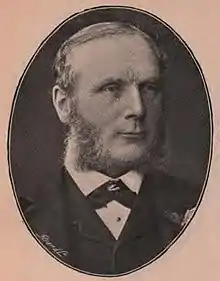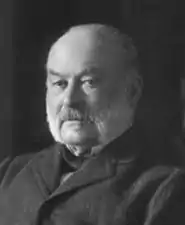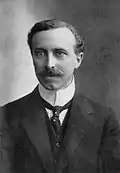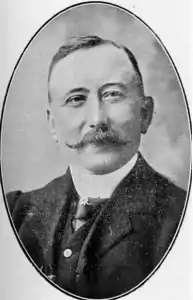| Walsall | |
|---|---|
| Former Borough constituency for the House of Commons | |
| 1832–1955 | |
| Seats | one |
| Created from | Walsall North and Walsall South |
Walsall was a borough constituency centred on the town of Walsall in the West Midlands of England. It returned one Member of Parliament (MP) to the House of Commons of the Parliament of the United Kingdom, elected by the first past the post voting system.
Boundaries
Throughout its existence, the seat included the entirety of the County Borough of Walsall. In 1955, it was split into Walsall North and Walsall South[1]
Members of Parliament
| Election | Member | Party | |
|---|---|---|---|
| 1832 | Charles Smith Forster | Tory[2] | |
| 1834 | Conservative[2] | ||
| 1837 | Francis Finch | Radical[2][3] | |
| February 1841 | John Neilson Gladstone | Conservative[2] | |
| June 1841 | Robert Scott | Whig[2][4] | |
| 1847 | Edward Littleton | Whig[5][6][7] | |
| 1852 | Sir Charles Forster | Radical[8][9][5][7] | |
| 1859 | Liberal | ||
| 1891 by-election | Edward Thomas Holden | Liberal | |
| 1892 | Frank James | Conservative | |
| 1893 by-election | Sir Arthur Hayter | Liberal | |
| 1895 | Sydney Gedge | Conservative | |
| 1900 | Sir Arthur Hayter | Liberal | |
| 1906 | Edward Marten Dunne | Liberal | |
| January 1910 | Sir Richard Cooper | Conservative | |
| 1918 | National | ||
| 1922 | Pat Collins | Liberal | |
| 1924 | William Preston | Conservative | |
| 1925 by-election | |||
| 1929 | John James McShane | Labour | |
| 1931 | Joseph Leckie | Liberal | |
| 1935 | Liberal National | ||
| 1938 by-election | Sir George Schuster | Liberal National | |
| 1945 | William Wells | Labour | |
| 1955 | constituency abolished: see Walsall North and Walsall South | ||
Elections
Elections in the 1830s
| Party | Candidate | Votes | % | ||
|---|---|---|---|---|---|
| Tory | Charles Smith Forster | 304 | 56.8 | ||
| Radical | George de Bosco Attwood | 231 | 43.2 | ||
| Majority | 73 | 13.6 | |||
| Turnout | 535 | 89.6 | |||
| Registered electors | 597 | ||||
| Tory win (new seat) | |||||
| Party | Candidate | Votes | % | ||
|---|---|---|---|---|---|
| Conservative | Charles Smith Forster | Unopposed | |||
| Registered electors | 578 | ||||
| Conservative hold | |||||
| Party | Candidate | Votes | % | ||
|---|---|---|---|---|---|
| Radical | Francis Finch | 316 | 51.6 | ||
| Conservative | Charles Smith Forster | 296 | 48.4 | ||
| Majority | 20 | 3.2 | |||
| Turnout | 612 | 82.0 | |||
| Registered electors | 746 | ||||
| Radical gain from Conservative | |||||
Elections in the 1840s
Finch resigned by accepting the office of Steward of the Chiltern Hundreds, causing a by-election.
| Party | Candidate | Votes | % | ±% | |
|---|---|---|---|---|---|
| Conservative | John Neilson Gladstone | 362 | 51.9 | +3.5 | |
| Radical | John Benjamin Smith | 335 | 48.1 | −3.5 | |
| Majority | 27 | 3.8 | N/A | ||
| Turnout | 697 | 86.3 | +4.3 | ||
| Registered electors | 808 | ||||
| Conservative gain from Radical | Swing | +3.5 | |||
| Party | Candidate | Votes | % | ±% | |
|---|---|---|---|---|---|
| Whig | Robert Wellbeloved Scott | 334 | 51.7 | New | |
| Conservative | John Neilson Gladstone | 312 | 48.3 | −0.1 | |
| Majority | 22 | 3.4 | N/A | ||
| Turnout | 646 | 80.0 | −2.0 | ||
| Registered electors | 808 | ||||
| Whig gain from Radical | Swing | N/A | |||
| Party | Candidate | Votes | % | ±% | |
|---|---|---|---|---|---|
| Whig | Edward Littleton | 289 | 41.6 | −10.1 | |
| Radical | Charles Forster | 282 | 40.6 | New | |
| Conservative | William Henry Cooke[11] | 124 | 17.8 | −30.5 | |
| Majority | 7 | 1.0 | −2.4 | ||
| Turnout | 695 | 81.2 | +1.2 | ||
| Registered electors | 856 | ||||
| Whig hold | Swing | +2.6 | |||
Elections in the 1850s
| Party | Candidate | Votes | % | ±% | |
|---|---|---|---|---|---|
| Radical | Charles Forster | Unopposed | |||
| Registered electors | 1,026 | ||||
| Radical gain from Whig | |||||
| Party | Candidate | Votes | % | ±% | |
|---|---|---|---|---|---|
| Radical | Charles Forster | Unopposed | |||
| Registered electors | 1,188 | ||||
| Radical hold | |||||
| Party | Candidate | Votes | % | ±% | |
|---|---|---|---|---|---|
| Liberal | Charles Forster | 495 | 56.4 | New | |
| Conservative | Charles Bagnall[12] | 383 | 43.6 | New | |
| Majority | 112 | 12.8 | N/A | ||
| Turnout | 878 | 80.4 | N/A | ||
| Registered electors | 1,092 | ||||
| Liberal hold | Swing | ||||
Elections in the 1860s
| Party | Candidate | Votes | % | ±% | |
|---|---|---|---|---|---|
| Liberal | Charles Forster | Unopposed | |||
| Registered electors | 1,296 | ||||
| Liberal hold | |||||
| Party | Candidate | Votes | % | ±% | |
|---|---|---|---|---|---|
| Liberal | Charles Forster | Unopposed | |||
| Registered electors | 6,047 | ||||
| Liberal hold | |||||
Elections in the 1870s
| Party | Candidate | Votes | % | ±% | |
|---|---|---|---|---|---|
| Liberal | Charles Forster | 3,364 | 66.0 | N/A | |
| Conservative | William Morrison Bell[13] | 1,731 | 34.0 | New | |
| Majority | 1,633 | 32.0 | N/A | ||
| Turnout | 5,095 | 58.7 | N/A | ||
| Registered electors | 8,684 | ||||
| Liberal hold | |||||
Elections in the 1880s
| Party | Candidate | Votes | % | ±% | |
|---|---|---|---|---|---|
| Liberal | Charles Forster | Unopposed | |||
| Registered electors | 9,537 | ||||
| Liberal hold | |||||
| Party | Candidate | Votes | % | ±% | |
|---|---|---|---|---|---|
| Liberal | Charles Forster | 5,112 | 59.8 | N/A | |
| Conservative | Frank James | 3,435 | 40.2 | New | |
| Majority | 1,677 | 19.6 | N/A | ||
| Turnout | 8,547 | 79.6 | N/A | ||
| Registered electors | 10,742 | ||||
| Liberal hold | Swing | N/A | |||
| Party | Candidate | Votes | % | ±% | |
|---|---|---|---|---|---|
| Liberal | Charles Forster | Unopposed | |||
| Liberal hold | |||||
Elections in the 1890s
Forster's death caused a by-election.
| Party | Candidate | Votes | % | ±% | |
|---|---|---|---|---|---|
| Liberal | Edward Holden | 4,899 | 52.9 | N/A | |
| Conservative | Frank James | 4,360 | 47.1 | New | |
| Majority | 539 | 5.8 | N/A | ||
| Turnout | 9,259 | 79.1 | N/A | ||
| Registered electors | 11,712 | ||||
| Liberal hold | Swing | N/A | |||
| Party | Candidate | Votes | % | ±% | |
|---|---|---|---|---|---|
| Conservative | Frank James | 5,226 | 51.2 | N/A | |
| Liberal | Edward Holden | 4,989 | 48.8 | N/A | |
| Majority | 237 | 2.4 | N/A | ||
| Turnout | 10,215 | 85.7 | N/A | ||
| Registered electors | 11,915 | ||||
| Conservative gain from Liberal | Swing | N/A | |||
The election was declared void on petition.

| Party | Candidate | Votes | % | ±% | |
|---|---|---|---|---|---|
| Liberal | Arthur Hayter | 5,235 | 50.4 | +1.6 | |
| Conservative | Charles Ritchie | 5,156 | 49.6 | −1.6 | |
| Majority | 79 | 0.8 | N/A | ||
| Turnout | 10,391 | 87.8 | +2.1 | ||
| Registered electors | 11,838 | ||||
| Liberal gain from Conservative | Swing | +1.6 | |||

| Party | Candidate | Votes | % | ±% | |
|---|---|---|---|---|---|
| Conservative | Sydney Gedge | 5,145 | 51.6 | +0.4 | |
| Liberal | Arthur Hayter | 4,828 | 48.4 | −0.4 | |
| Majority | 317 | 3.2 | +0.8 | ||
| Turnout | 9,973 | 90.5 | +4.8 | ||
| Registered electors | 11,015 | ||||
| Conservative hold | Swing | +0.4 | |||
Elections in the 1900s

| Party | Candidate | Votes | % | ±% | |
|---|---|---|---|---|---|
| Liberal | Arthur Hayter | 5,610 | 51.5 | +3.1 | |
| Conservative | Sydney Gedge | 5,285 | 48.5 | −3.1 | |
| Majority | 325 | 3.0 | N/A | ||
| Turnout | 10,895 | 84.8 | −5.7 | ||
| Registered electors | 12,851 | ||||
| Liberal gain from Conservative | Swing | +3.1 | |||
| Party | Candidate | Votes | % | ±% | |
|---|---|---|---|---|---|
| Liberal | Edward Dunne | 7,092 | 54.6 | +3.1 | |
| Conservative | Bernall Bagshawe | 5,893 | 45.4 | -3.1 | |
| Majority | 1,199 | 9.2 | +6.2 | ||
| Turnout | 12,985 | 91.9 | +7.1 | ||
| Registered electors | 14,127 | ||||
| Liberal hold | Swing | +3.1 | |||
Elections in the 1910s
| Party | Candidate | Votes | % | ±% | |
|---|---|---|---|---|---|
| Conservative | Richard Cooper | 7,290 | 51.9 | +6.5 | |
| Liberal | Edward Dunne | 6,745 | 48.1 | −6.5 | |
| Majority | 545 | 3.8 | N/A | ||
| Turnout | 14,035 | 95.4 | +3.5 | ||
| Registered electors | 14,713 | ||||
| Conservative gain from Liberal | Swing | +6.5 | |||
| Party | Candidate | Votes | % | ±% | |
|---|---|---|---|---|---|
| Conservative | Richard Cooper | 7,174 | 52.9 | +1.0 | |
| Liberal | John Morgan | 6,385 | 47.1 | -1.0 | |
| Majority | 789 | 5.8 | +2.0 | ||
| Turnout | 13,559 | 92.2 | -3.2 | ||
| Registered electors | 14,713 | ||||
| Conservative hold | Swing | +1.0 | |||
General Election 1914–15: Another General Election was required to take place before the end of 1915. The political parties had been making preparations for an election to take place and by the July 1914, the following candidates had been selected;
- Unionist: Richard Cooper
- Liberal: William Henry Brown[15]

| Party | Candidate | Votes | % | ±% | |
|---|---|---|---|---|---|
| National | Richard Cooper | 14,491 | 52.3 | −0.6 | |
| Labour | Joseph Thickett | 8,336 | 30.0 | New | |
| Liberal | William Henry Brown | 4,914 | 17.7 | −29.4 | |
| Majority | 6,155 | 22.3 | N/A | ||
| Turnout | 27,741 | 64.7 | −27.5 | ||
| National gain from Unionist | Swing | N/A | |||
- Cooper founded the National Party and had the support of the local Unionist Association. However, his candidature was not supported by Unionist party HQ or the Coalition Government.
Elections in the 1920s

| Party | Candidate | Votes | % | ±% | |
|---|---|---|---|---|---|
| Liberal | Pat Collins | 14,674 | 38.6 | +20.9 | |
| Unionist | Alice Cooper | 14,349 | 37.8 | -14.5 | |
| Labour | Robert Dennison | 8,946 | 23.6 | -6.4 | |
| Majority | 325 | 0.8 | N/A | ||
| Turnout | 37,969 | ||||
| Liberal gain from National | Swing | +17.7 | |||
| Party | Candidate | Votes | % | ±% | |
|---|---|---|---|---|---|
| Liberal | Pat Collins | 16,304 | 43.5 | +4.9 | |
| Unionist | Sydney Kersland Lewis | 14,141 | 37.8 | -0.0 | |
| Labour | Arthur Carr Osburn | 7,007 | 18.7 | -4.9 | |
| Majority | 2,163 | 5.7 | +4.9 | ||
| Turnout | 37,452 | 82.6 | |||
| Liberal hold | Swing | -2.4 | |||
| Party | Candidate | Votes | % | ±% | |
|---|---|---|---|---|---|
| Unionist | William Preston | 15,168 | 37.9 | +0.1 | |
| Liberal | Pat Collins | 12,734 | 31.8 | -11.7 | |
| Labour | Lothian Small | 11,474 | 28.7 | +10.0 | |
| Independent | J J Lynch | 622 | 1.6 | New | |
| Majority | 2,434 | 6.1 | N/A | ||
| Turnout | 39,998 | ||||
| Unionist gain from Liberal | Swing | ||||
| Party | Candidate | Votes | % | ±% | |
|---|---|---|---|---|---|
| Unionist | William Preston | 14,793 | 38.2 | +0.3 | |
| Liberal | Thomas Macnamara | 12,300 | 31.8 | +0.0 | |
| Labour | Lothian Small | 11,610 | 30.0 | +1.3 | |
| Majority | 2,493 | 6.4 | +0.3 | ||
| Turnout | 38,703 | 83.4 | |||
| Unionist hold | Swing | +0.1 | |||
| Party | Candidate | Votes | % | ±% | |
|---|---|---|---|---|---|
| Labour | John McShane | 20,524 | 39.6 | +9.6 | |
| Unionist | William Preston | 15,818 | 30.6 | -7.6 | |
| Liberal | Thomas Macnamara | 15,425 | 29.8 | -2.0 | |
| Majority | 4,706 | 9.0 | N/A | ||
| Turnout | 51,767 | 85.9 | +2.9 | ||
| Labour gain from Unionist | Swing | +8.6 | |||
Elections in the 1930s
| Party | Candidate | Votes | % | ±% | |
|---|---|---|---|---|---|
| Liberal | Joseph Leckie | 30,507 | 56.0 | +26.2 | |
| Labour | John McShane | 23,952 | 44.0 | +4.4 | |
| Majority | 6,555 | 12.0 | N/A | ||
| Turnout | 54,459 | 86.3 | +0.4 | ||
| Liberal gain from Labour | Swing | +10.9 | |||
- Conservative candidate, William J Talbot, withdrew.
| Party | Candidate | Votes | % | ±% | |
|---|---|---|---|---|---|
| National Liberal | Joseph Leckie | 28,563 | 57.5 | +1.5 | |
| Labour | William Graham | 19,594 | 39.5 | -4.5 | |
| Christian Socialist | J A Harper | 1,480 | 3.0 | New | |
| Majority | 8,959 | 18.0 | +6.0 | ||
| Turnout | 49,637 | 75.3 | -11.0 | ||
| National Liberal hold | Swing | +3.0 | |||
| Party | Candidate | Votes | % | ±% | |
|---|---|---|---|---|---|
| National Liberal | George Schuster | 28,720 | 57.1 | -0.4 | |
| Labour | George Jeger | 21,562 | 42.9 | +0.4 | |
| Majority | 7,158 | 14.2 | -0.8 | ||
| Turnout | 50,282 | 75.9 | +0.6 | ||
| National Liberal hold | Swing | -0.4 | |||
Elections in the 1940s
General Election 1939–40:
Another General Election was required to take place before the end of 1940. The political parties had been making preparations for an election and by the end of the Autumn of 1939, the following candidates had been selected;
- Liberal National: George Schuster
- Labour: A J Stanley[18]
| Party | Candidate | Votes | % | ±% | |
|---|---|---|---|---|---|
| Labour | William Wells | 28,324 | 53.9 | +14.4 | |
| National Liberal | George Schuster | 24,197 | 46.1 | -11.4 | |
| Majority | 4,127 | 7.8 | N/A | ||
| Turnout | 52,521 | 76.2 | +0.9 | ||
| Labour gain from National Liberal | Swing | ||||
Elections in the 1950s
| Party | Candidate | Votes | % | ±% | |
|---|---|---|---|---|---|
| Labour | William Wells | 36,483 | 56.0 | +2.1 | |
| National Liberal | John Barlow | 28,700 | 44.0 | -2.1 | |
| Majority | 7,783 | 12.0 | +4.2 | ||
| Turnout | 65,183 | 86.2 | +10.0 | ||
| Labour hold | Swing | ||||
| Party | Candidate | Votes | % | ±% | |
|---|---|---|---|---|---|
| Labour | William Wells | 33,556 | 52.3 | -3.7 | |
| Conservative | Frank Roper | 23,083 | 36.0 | -8.0 | |
| Liberal | Barbara Lewis | 7,517 | 11.7 | New | |
| Majority | 10,473 | 16.3 | +4.3 | ||
| Turnout | 64,156 | 83.1 | -3.1 | ||
| Labour hold | Swing | ||||
References
- ↑ Craig, F.W.S., ed. (1972). Boundaries of parliamentary constituencies 1985-1972. Chichester, Sussex: Political Reference Publications. ISBN 0-900178-09-4.
- 1 2 3 4 5 6 7 8 9 10 Stooks Smith, Henry (1845). The Parliaments of England, from 1st George I., to the Present Time. Vol II: Oxfordshire to Wales Inclusive. London: Simpkin, Marshall, & Co. p. 50. Retrieved 12 December 2018 – via Google Books.
- ↑ "State of Polls, & Members Returned". Worcester Journal. 27 July 1837. p. 3. Retrieved 21 December 2018 – via British Newspaper Archive.
- ↑ "Members Returned". Norfolk Chronicle. 3 July 1841. p. 2. Retrieved 21 December 2018 – via British Newspaper Archive.
- 1 2 "The General Election". Morning Post. 29 July 1847. pp. 2–4. Retrieved 15 July 2018 – via British Newspaper Archive.
- ↑ Miller, Henry (2015). Politics Personified: Portraiture, Caricature and Visual Culture in Britain, c. 1830-80. Manchester: Manchester University Press. p. 145. ISBN 978-0-7190-9084-4. Retrieved 15 July 2018 – via Google Books.
- 1 2 "Walsall". Globe. 29 July 1847. pp. 1–2. Retrieved 15 July 2018 – via British Newspaper Archive.
- ↑ "The Elections and their Results". Manchester Times. 10 July 1852. pp. 6–7. Retrieved 15 July 2018 – via British Newspaper Archive.
- ↑ "The Elections". Morning Post. 30 July 1847. p. 4. Retrieved 15 July 2018 – via British Newspaper Archive.
- 1 2 3 4 5 6 7 8 9 10 11 12 13 Craig, F. W. S., ed. (1977). British Parliamentary Election Results 1832-1885 (e-book) (1st ed.). London: Macmillan Press. p. 317. ISBN 978-1-349-02349-3.
- ↑ "The Elections". Hereford Journal. 21 July 1847. p. 2. Retrieved 22 December 2018 – via British Newspaper Archive.
- ↑ "Walsall Election". Walsall Free Press and General Advertiser. 21 May 1859. p. 1. Retrieved 15 July 2018 – via British Newspaper Archive.
- ↑ "The General Election". The Morning Post. 31 January 1874. pp. 2–3. Retrieved 22 January 2018 – via British Newspaper Archive.
- 1 2 3 4 5 6 7 8 9 10 Craig, F. W. S., ed. (1974). British Parliamentary Election Results: 1885-1918. London: Macmillan Press. p. 201. ISBN 9781349022984.
- ↑ Black Country History
- 1 2 3 4 5 British parliamentary election results 1918-1949 by FWS Craig
- 1 2 3 4 5 British Parliamentary Election Results 1918-1949, FWS Craig
- ↑ Report of the Annual Conference, 1939
- 1 2 British parliamentary election results 1950-1973 by FWS Craig
- ↑ The Times' Guide to the House of Commons. 1950.
Sources
- Craig, F. W. S. (1983) [1969]. British parliamentary election results 1918-1949 (3rd ed.). Chichester: Parliamentary Research Services. ISBN 0-900178-06-X.
- Leigh Rayment's Historical List of MPs – Constituencies beginning with "W" (part 1)